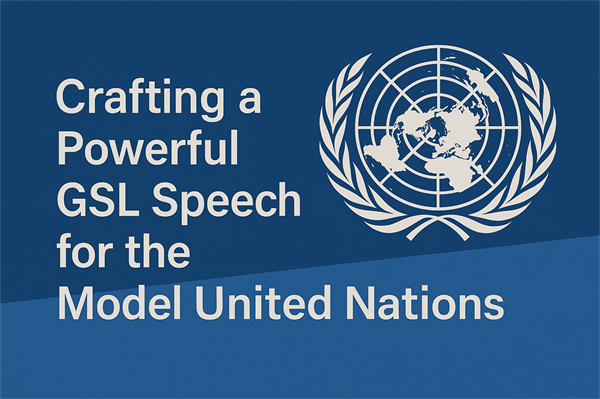How to Prepare for Model United Nations (MUN)
Model United Nations, or MUN, is one of the most exciting platforms for students to sharpen public speaking, debating, and diplomacy skills. It is a simulation of the United Nations where participants, known as delegates, represent countries and debate on pressing global issues. Whether you are a first-timer or someone looking to level up your skills, preparation is the key to excelling in MUN. Here’s a complete guide to help you prepare effectively.
1. Understand the Basics of MUN
Before diving into research, it’s important to understand what MUN really is. Delegates are assigned countries, committees, and topics. Their job is to represent their assigned nation’s stance, build alliances, and draft resolutions—just like real diplomats.
-
Committee: The organ of the UN you are in (e.g., UNGA, WHO, UNSC).
-
Agenda/Topic: The issue under discussion (e.g., climate change, refugee crisis).
-
Country: The nation you represent, whose policies you must defend.
Knowing these fundamentals will make it easier to shape your preparation strategy.
2. Research Your Country Thoroughly
One of the most important parts of MUN preparation is research. Your role is to become the voice of your assigned country, not your personal opinion.
-
Learn about your country’s history, geography, economy, and government.
-
Focus on foreign policies and international relations.
-
Find out your country’s alliances, conflicts, and past actions related to the agenda.
Reliable sources include government websites, UN databases, news portals, and research journals.
Tip: Maintain a research document where you organize your findings under headings like General Info, Foreign Policy, Stand on Agenda, Possible Allies, Possible Oppositions.
3. Understand the Agenda/Topic
Every MUN revolves around a specific global issue. Deeply study the background of the topic:
-
Why is this issue important?
-
What has the UN already done about it?
-
How has your country responded so far?
For example, if the agenda is “Global Refugee Crisis”, look into UNHCR’s role, major refugee-hosting nations, and your country’s past policies on migration.
This helps you form strong arguments backed by facts.
4. Draft a Position Paper
Most MUNs require a position paper, a short document stating your country’s stance on the agenda. It usually has three parts:
-
Introduction – Briefly describe the issue.
-
Country’s Position – Explain your country’s view on the problem.
-
Proposed Solutions – Offer policies your country would support.
A strong position paper gives you clarity while also impressing chairs and fellow delegates.
5. Learn the Rules of Procedure
MUNs follow specific parliamentary rules called Rules of Procedure (ROP). These cover how debates are conducted, when delegates can speak, how motions are raised, and how resolutions are voted upon.
Some key terms to know:
-
General Speakers’ List (GSL): The order in which delegates deliver speeches.
-
Moderated Caucus: Formal discussion with timed speeches.
-
Unmoderated Caucus: Informal lobbying and resolution drafting.
-
Motion: A formal request (e.g., “Motion for a 10-minute moderated caucus on…”)
Practicing ROP will help you avoid confusion during committee sessions.
6. Improve Public Speaking Skills
MUN is all about persuasion and diplomacy. Strong communication skills will set you apart.
-
Practice delivering short, impactful speeches.
-
Learn to speak with confidence, eye contact, and clarity.
-
Avoid reading directly from notes—use bullet points.
-
Time yourself to fit speeches within given limits (usually 1–2 minutes).
Tip: Record yourself speaking and review your tone, pace, and body language.
7. Master Lobbying and Teamwork
MUN isn’t only about speeches; it’s about building alliances. Lobbying is where you interact with delegates, form blocs, and draft joint resolutions.
-
Approach delegates politely and share ideas.
-
Be open to compromises without giving up your country’s core stance.
-
Try to emerge as a leader or consensus-builder.
Remember, diplomacy is about cooperation, not domination.
8. Draft Strong Resolutions
The final goal of MUN is to pass resolutions—written documents proposing solutions. Learn the format of a UN resolution:
-
Preambulatory Clauses: Background information (starting with words like Recognizing, Acknowledging).
-
Operative Clauses: Action points and solutions (starting with words like Urges, Calls for, Supports).
Your resolution should be realistic, detailed, and aligned with your country’s interests.
9. Prepare for Crisis Situations
Some MUNs introduce unexpected “crisis updates” during sessions. Be prepared to think on your feet.
-
Stay calm and adapt quickly.
-
Use your research to find logical responses.
-
Be creative but realistic in suggesting solutions.
10. Practice, Practice, Practice
Preparation isn’t complete without practice.
-
Do mock sessions with friends.
-
Watch videos of MUN debates.
-
Join your school/college MUN society for experience.
The more you practice, the more confident you’ll be.
Final Thoughts
Preparing for an MUN may seem overwhelming at first, but with the right approach, it becomes a rewarding experience. Remember, MUN is not just about winning awards; it’s about learning diplomacy, teamwork, and critical thinking. With thorough research, confident speaking, and smart negotiation, you can shine as a delegate.
So, gear up, put on your delegate badge, and step into the shoes of a diplomat. The world is waiting to hear your voice!


Comments
Post a Comment